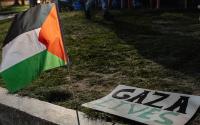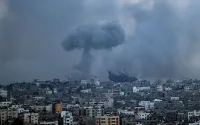This is retaliation. There is no need to disguise it with the language of morality
The Independent, 9 October 2001
The air attacks were a long time coming, but ultimately inevitable. There was no question that Washington had the right – indeed, the duty – to respond to the terrorist onslaught suffered by New York and Washington on 11 September. And there was no question that the United States was justified in using armed force. The cause, as President Bush, echoed by the Prime Minister, Tony Blair, stated with bald simplicity in announcing the start of military action on Sunday afternoon, is just.
No nation can fail to respond when several thousand people are deliberately murdered within its borders, however ill-defined or elusive the culprits. It is to the immense – and unexpected – credit of America that it approached the business of retaliation with such method, caution and responsibility. Resisting the temptation to lash out, it took time to gather intelligence, build its case and muster international support.
While Mr Bush could not cement as broad or single-minded an alliance as his father achieved to liberate Kuwait a decade ago, he has managed to avoid the impression of unilateral action by involving not only Britain, but also Nato and Australia in the military planning. As many as 40 countries have pledged their support to the US principle, if not in as active a capacity as Britain. Pakistan has stood firm, providing the US with logistical support and overflight rights.
Mr Bush has also managed so far not to alienate moderate Muslims or allow the conflict to be presented as one between the Western and Islamic worlds. This is an achievement to which British diplomacy made no small contribution. The US administration, like the British Government, has insisted, constantly – and correctly – on the distinction between those who committed the outrages and Muslims generally.
As Mr Blair said: "This is not a war with Islam." The perpetrators should not be described as "Islamic terrorists" but "terrorists pure and simple". He reiterated the point yesterday in his Commons statement, noting that the last time the US and Britain engaged in joint military action was in defence of a Muslim population, in Kosovo.
That having been said, however, neither the incontestable justice of the cause, nor the care with which the US has gone about co-ordinating its response, lessens the risks for all concerned. And before the impenetrable fog of war finally descends, as it is already starting to do in the form of disinformation and sanitised news, we want to register the strongest possible plea that – along with justice – clarity and truth should prevail.
The US and Britain, as the two major Allies engaged in the military operation, have not only been punctilious about distinguishing between the terrorists responsible for the killings in New York and Washington and adherents of Islam, they have also sought to present their fight as being against the al-Qa'ida organisation, not against the people of Afghanistan. So far so good. But it is disingenuous and unnecessary to dress up what is eminently justified retaliation and reprisal as something else.
Coupling the bombing (of "villains") with air-drops of food aid (for "the Afghan people") is undoubtedly meant to reinforce the message that the US and its allies are not tarring all Afghans with the brush of the Taliban. But, as aid agencies have reasonably pointed out, the message risks becoming confused, and the safety of aid workers could be endangered. The military attacks are a response to a terrorist atrocity, they have no need to be covered with the veneer of a humanitarian operation; that can – and should – come when the bombing is over.
Nor is there any need to justify the raids, as Mr Blair partially did on Sunday, as a move against the alleged role of al-Qa'ida and the Taliban in the international narcotics business. Reducing the flow of illegal drugs may be a by-product of any successful military action (though the Taliban have been known better for their opposition to the drugs trade than for their involvement in it), but it is not a reason why the US has mounted the operation or Britain has joined it.
There should be no illusions, either, about the fragility of the international alliance that the US and Britain have assembled, or the fragility of Afghanistan itself. Both could threaten the immediate and long-term success of the anti-terrorist campaign. The effort by the Allies to keep moderate Muslims – and the domestic Muslim constituencies – on board by drawing a line between Islam (good) and terrorism (bad) could rebound. Casualties among Afghan civilians could convince waverers in the Arab world that what is in progress is not in a fight against terrorism, but a conflict between the West and Islam. This would spawn the very ideological polarisation the Allies have been trying to pre-empt and precipitate a much wider and longer-term conflict.
Above all, there are questions to be addressed about the scope of the military operation launched at the weekend. Mr Bush said that the mission was "defined" and the goal "clear". This is far from evident. After focusing on bin Laden personally for weeks, the US is now stressing the need to neutralise al-Qa'ida and destroy the military capability of the Taliban. Yesterday, after trying to dispel rumours that it would extend its military action to Iraq, the US informed the UN Security Council that it reserved the right to extend operations beyond Afghanistan.
With the stability of the Taliban regime in question, and doubts about whether the US has feasible contingency plans for a successor administration in Afghanistan, any talk of extending the current operation is premature in the extreme and strongly to be discouraged. The purpose of the current military action should be clearly defined and clearly explained as a matter of urgency. Only then will we be able to judge its success.






